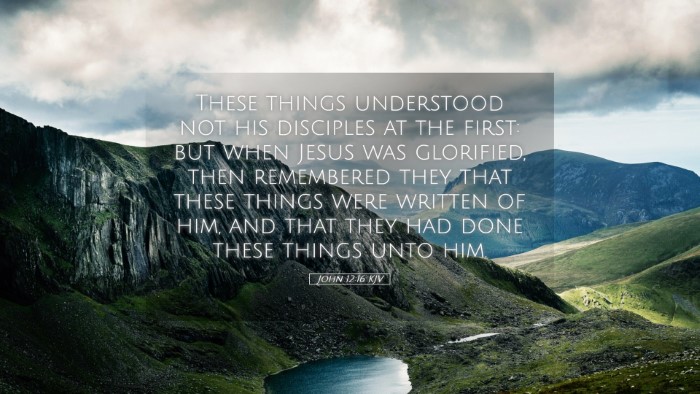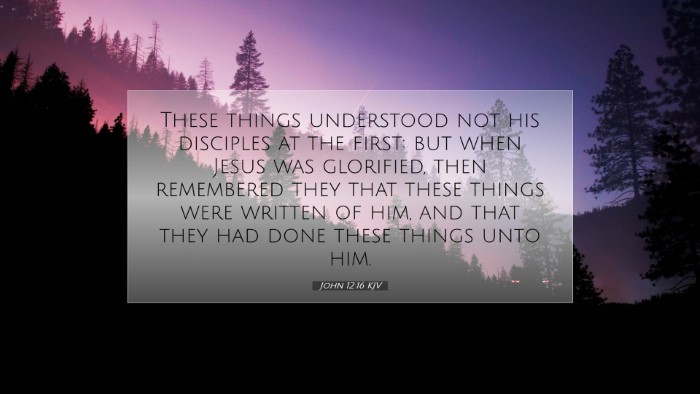Commentary on John 12:16
Verse (John 12:16): "These things understood not his disciples at the first: but when Jesus was glorified, then remembered they that these things were written of him, and that they had done these things unto him."
Introduction
The verse serves as a pivotal moment in the Gospel of John, illustrating the interplay between prophetic fulfillment and the disciples' understanding. Various commentaries elucidate the theme of revelation and comprehension that is central to this scripture.
Context and Background
This passage occurs during a significant time in Jesus' ministry, just prior to His triumphal entry into Jerusalem. Historical and cultural contexts are essential to grasp the magnitude of the events described. The disciples are in a state of confusion, which Matthew Henry notes as typical of their journey with Jesus.
- Matthew Henry: Emphasizes that the disciples' understanding was limited prior to Jesus' glorification, pointing out that they later perceived how these events correlated with Old Testament prophecies.
- Albert Barnes: Highlights the importance of the disciples' eventual understanding and how divine revelation is often progressive.
- Adam Clarke: Discusses the implications of the disciples' initial ignorance as a contrast to their later enlightenment following the Resurrection.
The Disciples' Initial Ignorance
The phrase "understood not" speaks volumes about the disciples' spiritual state at that time. Their misunderstanding was not due to a lack of zeal or interest but rather a divine withholding of understanding. This is echoed in the commentary reflections where several authors refer to the "mystery" that surrounded Jesus' mission and identity.
- Matthew Henry: Points out that the true meaning of Christ's actions often eluded even those closest to Him during his earthly ministry.
- Albert Barnes: States that this lack of understanding was a part of God’s plan to reveal Himself fully in time.
- Adam Clarke: Affirms the idea that the difficulties the disciples faced were necessary for the later recognition of Christ's divine authority.
Divine Revelation and Timing
When it says, "when Jesus was glorified," it reveals a turning point. The glorification of Jesus—as understood by commentators—refers to His resurrection and ascension, which ultimately enlightens both the disciples and believers alike.
- Matthew Henry: States that this glorification served to confirm their faith and understanding of Scripture.
- Albert Barnes: Emphasizes that the subsequent understanding of the disciples contrasts their previous ignorance and speaks to the idea of spiritual growth and revelation.
- Adam Clarke: Notes that the realization of Jesus as the Messiah was substantiated through His resurrection, fulfilling the prophetic writings that they later remembered.
Scriptural Fulfillment
The remembrance of "that these things were written of him" indicates a deep interconnection between Old Testament prophecies and New Testament realities. The disciples, upon reflection, recognized that their experiences mirrored the prophetic corp of Scripture.
- Matthew Henry: Highlights various Old Testament prophecies, suggesting that the events surrounding Jesus were preordained and served to fulfill God's overarching plan.
- Albert Barnes: Suggests that an understanding of Old Testament texts became clearer in light of Jesus' life and ministry, illustrating the unity of Scripture.
- Adam Clarke: Encourages readers to see the historical context of these prophecies and how they shaped the disciples’ awareness of their mission.
Theological Implications
This verse draws significant theological implications regarding the nature of divine revelation. It illustrates not only the disciples' initial blindness but also their eventual enlightenment—suggesting that understanding often requires divine intervention and timing.
- Matthew Henry: Discusses how spiritual discernment is often a gradual process, reflecting the journey of faith.
- Albert Barnes: Highlights the importance of the Holy Spirit in illuminating truth within believers, reiterating that understanding grows over time.
- Adam Clarke: Suggests that this reflects a broader principle that God reveals truth progressively, demanding faith and patience from His followers.
Application for Believers
The complexities of understanding scriptural truths are applicable to all believers. This passage urges Christians to seek and anticipate further revelations from God in their understanding of Scripture and personal faith journeys.
- Matthew Henry: Encourages believers to remain open to learning and discovering the complexities of their faith.
- Albert Barnes: Advises believers to trust in God’s timing while seeking deeper truths about Christ and His word.
- Adam Clarke: Reminds the faithful that God’s plans are grand, and humans must cultivate patience as they await understanding.
Conclusion
John 12:16 encapsulates a profound truth about faith—the necessity of divine timing in understanding the fullness of God’s revelation. By reflecting on the insights of these public domain commentaries, we are encouraged to recognize our own spiritual journeys, embracing the gradual process of coming to know Christ more fully.


